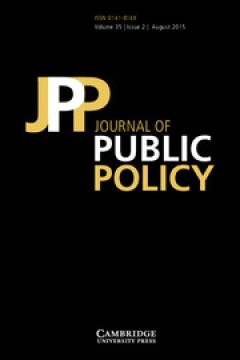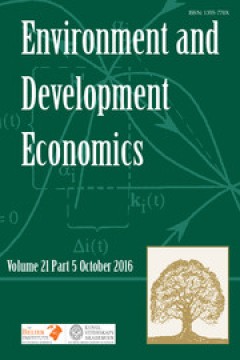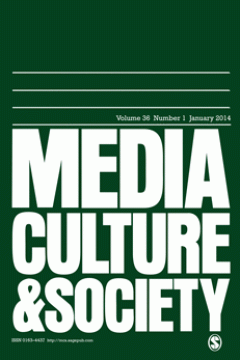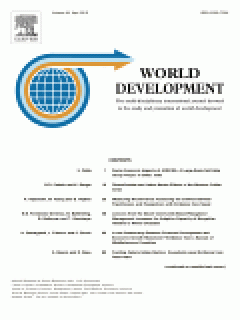Filter by

Journal of Public Policy, Volume 36 - Issue 3 - September 2016
- Edition
- -
- ISBN/ISSN
- 0141-814X
- Collation
- -
- Series Title
- -
- Call Number
- -
- Edition
- -
- ISBN/ISSN
- 0141-814X
- Collation
- -
- Series Title
- -
- Call Number
- -

Environment and Development Economics, Volume 21 - Issue 5 - October 2016
- Edition
- -
- ISBN/ISSN
- 1355770X
- Collation
- -
- Series Title
- -
- Call Number
- -
- Edition
- -
- ISBN/ISSN
- 1355770X
- Collation
- -
- Series Title
- -
- Call Number
- -

Environment and Development Economics, Volume 21 - Issue 1 - February 2016
- Edition
- -
- ISBN/ISSN
- 1355770X
- Collation
- -
- Series Title
- -
- Call Number
- -
- Edition
- -
- ISBN/ISSN
- 1355770X
- Collation
- -
- Series Title
- -
- Call Number
- -

Understanding media production: a rejoinder to Murdock and Golding
This article is a rejoinder to Murdock and Golding’s response to my critique of the political economy of communications (PEC) analysis of media production. This article sets this exchange in the context of a broader debate in recent editions of Media, Culture & Society about the value of PEC. Much of the debate stems from Garnham’s critical review of 40?years of PEC research.
- Edition
- Volume 38, Issue 8, November 2016; pp. 1272–1275
- ISBN/ISSN
- 0163-4437
- Collation
- -
- Series Title
- -
- Call Number
- -

Ideology: towards renewal of a critical concept
In this response to our critics and fellow-travellers we reaffirm our claim that contemporary media studies should reinvent a critical concept of ideology. We do this through addressing some of the problems with older critical conceptions of ideology and suggesting potentially fruitful ways forward through engaging with research traditions that have become neglected or are overlooked in the fie…
- Edition
- Volume 38, Issue 8, November 2016; pp. 1261–1271
- ISBN/ISSN
- 0163-4437
- Collation
- -
- Series Title
- Media, Culture & Society
- Call Number
- -

‘Political gladiators’ on Facebook in Zimbabwe: a discursive analysis of …
Social media have been hailed as liberative in contexts of political repression. In Zimbabwe, there are emergent debates on the possibilities of using Facebook to ‘democratise’ political space. But the use of Facebook to settle personal political scores or to relentlessly attack political opposition seemed to have escaped academic scrutiny. This study looks at the use of Facebook by opposing ca…
- Edition
- Volume 38, Issue 8, November 2016; pp. 1247–1260
- ISBN/ISSN
- 0163-4437
- Collation
- -
- Series Title
- Media, Culture & Society
- Call Number
- -

Live from the pastures: Maasai YouTube protest videos
While much attention has turned to new and social media as tools to facilitate democratic participation, little attention has been paid to the ways that these tools are used by rural and nomadic communities. In this article, I examine the ways that Maasai pastoral-nomads are utilizing YouTube to present evidence of eviction, hunger, and other threats to their communities. I explore how the Maas…
- Edition
- Volume 38, Issue 8, November 2016; pp. 1236–1246
- ISBN/ISSN
- 0163-4437
- Collation
- -
- Series Title
- Media, Culture & Society
- Call Number
- -

Post-feminism for children: feminism ‘repackaged’ in the Bratz films
After their release in 2001, Bratz dolls carved into Barbie’s previously monopolistic share of teen doll sales. Amidst their growing popularity, cultural critics expressed a host of concerns about Bratz dolls, especially over how they sexualize youth, but the line grew to include a host of products like costumes, makeup kits, games, books, clothing, and movies. It also inspired new, similar dol…
- Edition
- Volume 38, Issue 8, November 2016; pp. 1218–1235
- ISBN/ISSN
- 0163-4437
- Collation
- -
- Series Title
- Media, Culture & Society
- Call Number
- -

Inventing the ‘authentic’ self: American television and Chinese audiences…
This article examines the ways educated urban Chinese youths engage American television fiction as part of their identity work. Drawing on theories of modern reflexive identity and based on 29 interviews with US TV fans among university students in Beijing, I found these youths are drawn to this television primarily because they perceive the American way of life portrayed on it as more ‘authent…
- Edition
- Volume 38, Issue 8, November 2016; pp. 1201–1217
- ISBN/ISSN
- 0163-4437
- Collation
- -
- Series Title
- Media, Culture & Society
- Call Number
- -

Fit for prosumption: interactivity and the second fitness boom
This article advances the claim that a new ‘fitness boom’ has arrived, one marked by the proliferation of devices such as wearable fitness trackers. The first fitness boom of the 1970s/1980s was characterized by the heightened availability of fitness ‘tools’ and the supposition that pursuing a ‘fit’ lifestyle was tantamount to responsible living. The new era in fitness intensifies foregoing fit…
- Edition
- Volume 38, Issue 8, November 2016; pp. 1184–1200
- ISBN/ISSN
- 0163-4437
- Collation
- -
- Series Title
- Media, Culture & Society
- Call Number
- -

Celebrity capital in the political field: Russell Brand’s migration from st…
Our case study of charismatic celebrity comedian Russell Brand’s turn to political activism uses Bourdieu’s field theory to understand the process of celebrity migration across social fields. We investigate how Brand’s capital as a celebrity performer, storyteller and self-publicist translated from comedy to politics. To judge how this worked in practice, we analysed the comedic strategies used…
- Edition
- Volume 38, Issue 8, November 2016; pp. 1136–1152
- ISBN/ISSN
- 0163-4437
- Collation
- -
- Series Title
- Media, Culture & Society
- Call Number
- -

The digital mundane: social media and the military
This article draws on empirical data with British military personnel in order to investigate what we call the digital mundane in military life. We argue that social media and smartphone technologies within the military offer a unique environment in which to investigate the ways individuals position themselves within certain axes of institutional and cultural identities. At the same time, the co…
- Edition
- Volume 38, Issue 8, November 2016; pp. 1153–1168
- ISBN/ISSN
- 0163-4437
- Collation
- -
- Series Title
- Media, Culture & Society
- Call Number
- -

Everyday life and locative play: an exploration of Foursquare and playful eng…
Foursquare is a location-based social network (LBSN) that combines gaming elements with features conventionally associated with social networking sites (SNSs). Following two qualitative studies, this article sets out to explore what impact this overlaying of physical environments with play has on everyday life and experiences of space and place. Drawing on early understandings of play, alongsid…
- Edition
- Volume 38, Issue 8, November 2016; pp. 1169–1183
- ISBN/ISSN
- 0163-4437
- Collation
- -
- Series Title
- Media, Culture & Society
- Call Number
- -

We are one Kenya: representations of the nation, leadership, and de-ethnicize…
This research analyzes Uongozi, a massive multimodal civic education campaign that culminated in the Uongozi reality television show, situating the campaign within its socio-political context. Our analysis suggests that Uongozi framed and promoted a version of leadership that is tied to an idealized progressive, youth leader despite the lack of quality youth ‘candidates’ on the show. The campai…
- Edition
- Volume 38, Issue 8, November 2016; pp. 1119–1135
- ISBN/ISSN
- 0163-4437
- Collation
- -
- Series Title
- Media, Culture & Society
- Call Number
- -

Media Culture & Society, Volume 38, Number 8, November 2016
- Edition
- -
- ISBN/ISSN
- 0163-4437
- Collation
- -
- Series Title
- -
- Call Number
- -
- Edition
- -
- ISBN/ISSN
- 0163-4437
- Collation
- -
- Series Title
- -
- Call Number
- -

Media Culture & Society, Volume 38, Number 7, October 2016
- Edition
- -
- ISBN/ISSN
- 0163-4437
- Collation
- -
- Series Title
- -
- Call Number
- -
- Edition
- -
- ISBN/ISSN
- 0163-4437
- Collation
- -
- Series Title
- -
- Call Number
- -

Media Culture & Society, Volume 38, Number 6, September 2016
- Edition
- -
- ISBN/ISSN
- 0163-4437
- Collation
- -
- Series Title
- -
- Call Number
- -
- Edition
- -
- ISBN/ISSN
- 0163-4437
- Collation
- -
- Series Title
- -
- Call Number
- -

World Development, Volume 87, November 2016
- Edition
- -
- ISBN/ISSN
- 0305750X
- Collation
- -
- Series Title
- -
- Call Number
- -
- Edition
- -
- ISBN/ISSN
- 0305750X
- Collation
- -
- Series Title
- -
- Call Number
- -

World Development, Volume 88, December 2016
- Edition
- -
- ISBN/ISSN
- 0305750X
- Collation
- -
- Series Title
- -
- Call Number
- -
- Edition
- -
- ISBN/ISSN
- 0305750X
- Collation
- -
- Series Title
- -
- Call Number
- -

World Development, Volume 89, January 2017
- Edition
- -
- ISBN/ISSN
- 0305750X
- Collation
- -
- Series Title
- -
- Call Number
- -
- Edition
- -
- ISBN/ISSN
- 0305750X
- Collation
- -
- Series Title
- -
- Call Number
- -
 Computer Science, Information & General Works
Computer Science, Information & General Works  Philosophy & Psychology
Philosophy & Psychology  Religion
Religion  Social Sciences
Social Sciences  Language
Language  Pure Science
Pure Science  Applied Sciences
Applied Sciences  Art & Recreation
Art & Recreation  Literature
Literature  History & Geography
History & Geography